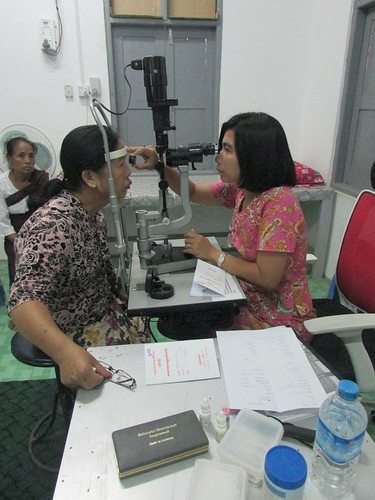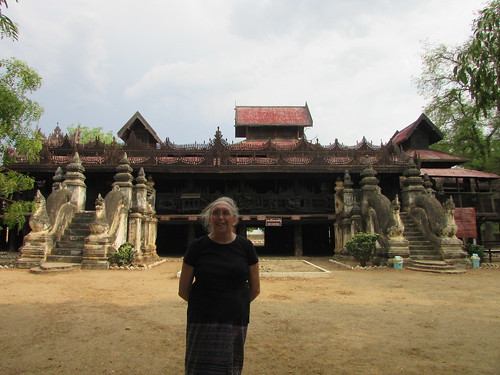I was booked into the Aye Yar River View Resort for our four days in Bagan. For me, this location has two particular attractions. Firstly, the 'River View Rooms' are literally that. They are built on the east bank of the Ayeyarwaddy River (but at a higher level) with only a narrow strip, a hedge and asandy track between the base of the hotel building and the river with a variety of moored boats visible. It can be noisy at times - most of the smaller 'longtail' boats are propelled by raucous Chinese-built single-cylinder diesel engines which kick up quite a racket and the powerful tug-boats which power the barge traffic have large, loud marine diesels. But if, like me, you're an incurable romantic, it gives a connection with "The beating Heart of Burma" and, I noticed this time, the hotel provides disposable ear plugs. The second attraction is that the hotel is within walking distance of the Bagan Medical Clinic via a network of dusty, unsealed roads quite busy with pedestrian and motor cycle traffic. The walk takes ten or twenty minutes, depending how fast you walk and how impervious to sun you are (I'm not very good on either count any longer). However, Doctor Hla Tun usually insists on my using the monastery car for the commute.
The car picked me up, as arranged, at 8.30 a.m. and by the time I arrived at the Clinic, Doctor Hla Tun had already started consulations. The Clinic was noticeably busier than the previous day and I think the total patient registrations for the day exceeded 200.
Doctor Hla Tun introduced me to the lady opthalmologist who now conducts eye tests at the Clinic on a every other Saturday and I was able to watch her at work. Later I discovered that in the week, she works in Chaulk Hospital.

The lady Opthalmologist at Bagan Medical Clinic.
I'll describe my morning observing Dr. Hla Tun's consultations in a separate post.
Doctor Hla Tun asked if I had visited the famous monastery at Salay (sometimes transliterated as 'Sale'). As I had not, he arranged what turned out to be a fascinating trip for the afternoon. We set off in the monastery car with the young monk in the front passenger seat and the lady opthamologist and I in the rear.
We left Bagan heading south, passing first through the village of Myinkaba and then through a rather modern area called 'New Bagan'. We kept going firstly through the familiar landscape of the Bagan Plain but then becoming very undulating and, to my surprise, I spotted a number of four-legged steel oil derricks dotted around.
Chaulk Oilfield
I knew that Burma was an early producer of mineral oils but I had no idea that the Chaulk Oilfield (the name is sometimes transliterated with an 'l', sometimes without)was on our route, still less that it still produced useful amounts of oil.
The first derricks we saw were exactly as you see in old pictures but later we encountered a much simpler design which appeared to comprise a tripod of three wooden poles with simple wooden horizontal bracing. Where derricks were close to the road, I saw traditional 'nodding donkey' oil well pumps lazily extracting 'black gold' from the bore hole and delivering the oil through a flexible pipe to some unseen collection point. A network of overhead electric distribution systems, some appearing quite elderly, criss-crossed the skyline, carrying power to the numerous electric well pumps. I saw a reference to Well number 1118! Myanmar Oil and Gas Enterprise (MOGE) lists the Chauk Oilfield as having been discovered in 1902 and still producing. There's an MOGE slideshow here and a Wikipedia article here
Near Chaulk town I saw a large farm of oil storage tanks and, further south, a single pipeline apparently lying on the ground ran parallel to the road. After a few miles, we came to an industrial complex which I assumed (principally from a series of 'flare stacks') was an elderly and relatively small-scale oil refinery.
Salay
The town of Salay is famous for its 'Yoke-Sone-Kyaung' monastery with its spectacular woodcarvings now in the care of the Department of Archaeology & National Museum. Built entirely of wood, and crammed with various artefacts, I found it a fascinating place. As I explored the gloomy rooms, thunder and lightning was followed by torrential tropical rain, sending the attendants scurrying to close the top-hinged 'doors' which formed the sides of the building. The storm was short-lived and it was dry as I returned to the monastery car.
 Jan at Salay Monastery.
Jan at Salay Monastery.
Sarkjouhla Pagoda
We then drove a few miles to the venerated temple of Sarkjouhla, dating back to 1191 A.D. Having explored the various elements of the complex, we headed back north.
Back to Bagan
We dropped the Opthalmolgist at her home in Chaulk before completing the journey back to Bagan Medical Clinic. Tired by the journey, it wasn't long before I accepted the offer of a car to my hotel. Doctor Hla Tun and his staff were working until midnight to finish treating the patients that day.
Related posts
Next post in this series.
All my posts on this trip can be found here.
My pictures
There are a few pictures of this trip here.
More pictures will be posted as soon as possible.
